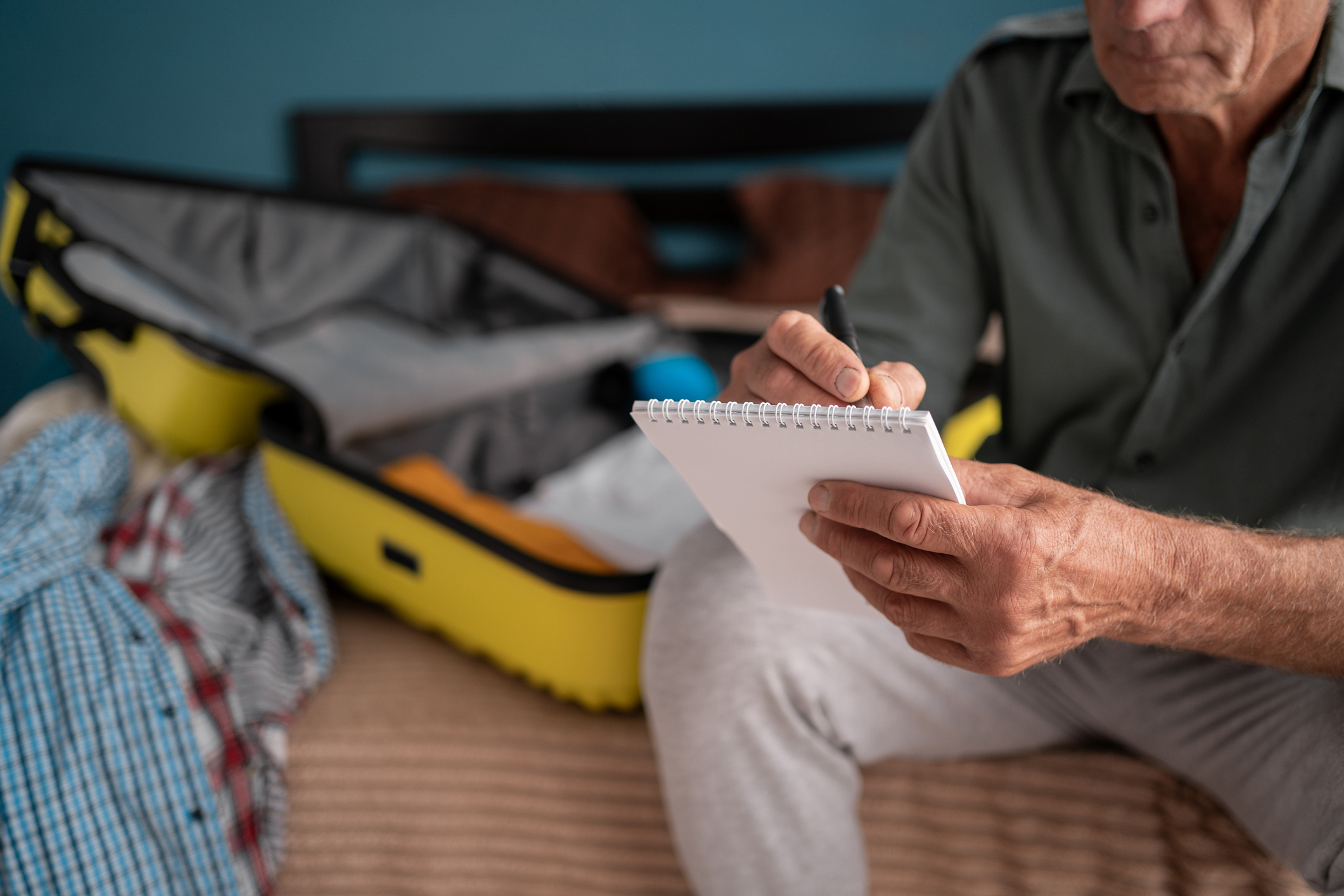The Ultimate Cruise Packing List for Retirees
Ready to set sail on your dream cruise? Here’s a no-fuss packing list tailored for older travelers to keep your trip stress-free.


Profit and prosper with the best of Kiplinger's advice on investing, taxes, retirement, personal finance and much more. Delivered daily. Enter your email in the box and click Sign Me Up.
You are now subscribed
Your newsletter sign-up was successful
Want to add more newsletters?

Delivered daily
Kiplinger Today
Profit and prosper with the best of Kiplinger's advice on investing, taxes, retirement, personal finance and much more delivered daily. Smart money moves start here.

Sent five days a week
Kiplinger A Step Ahead
Get practical help to make better financial decisions in your everyday life, from spending to savings on top deals.

Delivered daily
Kiplinger Closing Bell
Get today's biggest financial and investing headlines delivered to your inbox every day the U.S. stock market is open.

Sent twice a week
Kiplinger Adviser Intel
Financial pros across the country share best practices and fresh tactics to preserve and grow your wealth.

Delivered weekly
Kiplinger Tax Tips
Trim your federal and state tax bills with practical tax-planning and tax-cutting strategies.

Sent twice a week
Kiplinger Retirement Tips
Your twice-a-week guide to planning and enjoying a financially secure and richly rewarding retirement

Sent bimonthly.
Kiplinger Adviser Angle
Insights for advisers, wealth managers and other financial professionals.

Sent twice a week
Kiplinger Investing Weekly
Your twice-a-week roundup of promising stocks, funds, companies and industries you should consider, ones you should avoid, and why.

Sent weekly for six weeks
Kiplinger Invest for Retirement
Your step-by-step six-part series on how to invest for retirement, from devising a successful strategy to exactly which investments to choose.
At last, you're setting sail on the cruise of your dreams. And now you’re counting the days until you can soak up the sun, sip cocktails, and maybe even try a little dancing into the wee hours of the night. As an older traveler, you want to pack smart — everything you need for comfort and fun, without lugging around a suitcase the size of a small car.
If you’ve never been on a cruise, packing can be both exciting and intimidating. Even if you’re a seasoned traveler, packing for a cruise to Alaska is much different from packing for a cruise to the Caribbean. The same can be said for individual cruises. Some lines may have strict policies about what you can (and can’t) bring on board. Not every cruise ship caters to every traveler, so before you set sail, double-check your cruise line’s packing guidelines and restrictions.
For instance, some cruises are more formal than others. Lines like Cunard and Celebrity Cruises typically have stricter dress codes for formal nights, while lines like Carnival and Norwegian Cruise Line are generally more casual. This can vary significantly between different cruise lines and even between ships within the same line.
From just $107.88 $24.99 for Kiplinger Personal Finance
Become a smarter, better informed investor. Subscribe from just $107.88 $24.99, plus get up to 4 Special Issues

Sign up for Kiplinger’s Free Newsletters
Profit and prosper with the best of expert advice on investing, taxes, retirement, personal finance and more - straight to your e-mail.
Profit and prosper with the best of expert advice - straight to your e-mail.
With that in mind, this list assumes a typical 7- to 14-day cruise with mixed climates and activities. Be sure to make adjustments based on your cruise’s duration, destinations, and personal needs, such as health or mobility aids.
Cruise packing list

Travel documents and essentials
- Passport or VISA (if required)
- Printed or digital cruise tickets and boarding passes
- Photo ID, driver’s license, or government-issued ID
- Travel insurance documents
- A credit card and cash for souvenirs, food, tips, and taxi fares when you’re in ports of call. Leave the checkbook at home.
- Emergency contact list and list of prescriptions
- Copies of itinerary and reservations
Shoes and clothing
George and Darla, a retired couple, were excited for their first Mediterranean cruise. For weeks, they were glued to the weather, checking forecasts for every port on their itinerary. George tossed in a pile of heavy sweaters for those chilly evenings, but somehow forgot his swimsuit. Darla packed a raincoat, four sweaters, an umbrella and a rain hat — enough for a monsoon. Sunscreen? Neither thought of it. Their suitcases were so stuffed, they had to sit on them to close.
Don’t pack like George and Darla — keep it light and suited to your destination.
- Comfy clothes for lounging, including a cozy sweater for chilly evenings on the deck.
- Casual outfits, lightweight shirts, pants and shorts for daytime
- Sleepwear
- Formal attire, dresses and suits for dining nights. Some lines, like the Cunard, have formal nights — think fancy dresses and dinner jackets, a tuxedo or formal dark suit for men.
- Rain gear for rainy days
- A lightweight jacket or sweater for cooler evenings
- Swimwear and cover-ups
- Sturdy walking shoes for shore excursions, dressy shoes, and flip-flops for the pool.
- Underwear and socks
- Sun hat or cap
- Workout clothes and shoes if you plan to use the ship’s gym
Personal care and health items
- Very important: Pack enough prescription medications in original bottles for the whole trip, plus a few extra days, in your carry-on for easy access.
- Over-the-counter medications, like pain relievers, motion sickness pills or antacids
- Sunglasses and sunscreen. Keep in mind that some destinations, like the Great Barrier Reef in Australia, require you to use biodegradable sunscreen.
- Glasses, contact lenses and solution
- Hearing aid batteries, if applicable
- Antiseptic wipes or hand sanitizer and face masks. These are optional and based on your preferences.
- Deodorant, shampoo, conditioner and body wash
- Razor and shaving cream
- Makeup and makeup remover
- Hairbrush or comb
Electronics and accessories
- Smartphone, e-reader, computer or tablet, and chargers
- Travel adapter if you’re visiting international ports
- Camera (optional, as your cellphone camera is just fine for most photos)
- Earbuds or headphones
- Small waterproof bag for electronics in case of rain or for water-based excursions
Cruise-specific items
- Reusable water bottle for poolside or while visiting ports of call
- Daypack or small bag for souvenirs or beach days
- Small binoculars for “spotting dolphins” from the ship’s deck
- Lanyard for cruise card, room key and ID (if preferred)
- Travel journal or notebook for writing down the dozens of memories you’ll take back home
- A good book, if you prefer it to an e-reader, for downtime
- Snacks, especially if you have dietary needs
Tips to avoid overpacking
- Check cruise line dress codes before you pack and plan accordingly.
- Confirm port weather to avoid bringing unnecessary items
- Pack mix-and-match clothing to maximize versatility and keep things simple
- Leave room for souvenirs — don’t start with an overly stuffed suitcase.

Before setting sail
Remember. You’re retired and going on the cruise you’ve always dreamed of. Overpacking, forgetting your toothbrush, medications, or travel documents can weigh you down, literally and figuratively. Stick to versatile clothing that suits your destinations and only pack must-have gadgets, leaving space for souvenirs for the grandkids. Your cruise destination almost entirely determines what you need, so pack smart, travel light and enjoy the journey. Bon voyage!
Related content
Profit and prosper with the best of Kiplinger's advice on investing, taxes, retirement, personal finance and much more. Delivered daily. Enter your email in the box and click Sign Me Up.

For the past 18+ years, Kathryn has highlighted the humanity in personal finance by shaping stories that identify the opportunities and obstacles in managing a person's finances. All the same, she’ll jump on other equally important topics if needed. Kathryn graduated with a degree in Journalism and lives in Duluth, Minnesota. She joined Kiplinger in 2023 as a contributor.
-
 Quiz: Do You Know How to Avoid the "Medigap Trap?"
Quiz: Do You Know How to Avoid the "Medigap Trap?"Quiz Test your basic knowledge of the "Medigap Trap" in our quick quiz.
-
 5 Top Tax-Efficient Mutual Funds for Smarter Investing
5 Top Tax-Efficient Mutual Funds for Smarter InvestingMutual funds are many things, but "tax-friendly" usually isn't one of them. These are the exceptions.
-
 AI Sparks Existential Crisis for Software Stocks
AI Sparks Existential Crisis for Software StocksThe Kiplinger Letter Fears that SaaS subscription software could be rendered obsolete by artificial intelligence make investors jittery.
-
 Quiz: Do You Know How to Avoid the 'Medigap Trap?'
Quiz: Do You Know How to Avoid the 'Medigap Trap?'Quiz Test your basic knowledge of the "Medigap Trap" in our quick quiz.
-
 We Retired at 62 With $6.1 Million. My Wife Wants to Make Large Donations, but I Want to Travel and Buy a Lake House.
We Retired at 62 With $6.1 Million. My Wife Wants to Make Large Donations, but I Want to Travel and Buy a Lake House.We are 62 and finally retired after decades of hard work. I see the lakehouse as an investment in our happiness.
-
 Social Security Break-Even Math Is Helpful, But Don't Let It Dictate When You'll File
Social Security Break-Even Math Is Helpful, But Don't Let It Dictate When You'll FileYour Social Security break-even age tells you how long you'd need to live for delaying to pay off, but shouldn't be the sole basis for deciding when to claim.
-
 One of the Most Powerful Wealth-Building Moves a Woman Can Make: A Midcareer Pivot
One of the Most Powerful Wealth-Building Moves a Woman Can Make: A Midcareer PivotIf it feels like you can't sustain what you're doing for the next 20 years, it's time for an honest look at what's draining you and what energizes you.
-
 I'm a Wealth Adviser Obsessed With Mahjong: Here Are 8 Ways It Can Teach Us How to Manage Our Money
I'm a Wealth Adviser Obsessed With Mahjong: Here Are 8 Ways It Can Teach Us How to Manage Our MoneyThis increasingly popular Chinese game can teach us not only how to help manage our money but also how important it is to connect with other people.
-
 Looking for a Financial Book That Won't Put Your Young Adult to Sleep? This One Makes 'Cents'
Looking for a Financial Book That Won't Put Your Young Adult to Sleep? This One Makes 'Cents'"Wealth Your Way" by Cosmo DeStefano offers a highly accessible guide for young adults and their parents on building wealth through simple, consistent habits.
-
 Global Uncertainty Has Investors Running Scared: This Is How Advisers Can Reassure Them
Global Uncertainty Has Investors Running Scared: This Is How Advisers Can Reassure ThemHow can advisers reassure clients nervous about their plans in an increasingly complex and rapidly changing world? This conversational framework provides the key.
-
 5 Ronald Reagan Quotes Retirees Should Live By
5 Ronald Reagan Quotes Retirees Should Live ByThe Nation's 40th President's wit and wisdom can help retirees navigate their financial and personal journey with confidence.